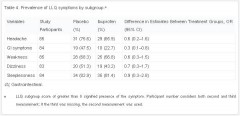17/04/2012
Ibuprofen pour le mal des montagnes
L'utilisation du diamox est reconnu pour la prévention du mal aigu des montagnes (Lire l'article). L'ibuprofen serait également efficace.
Ibuprofen Prevents Altitude Illness: A Randomized Controlled Trial for Prevention of Altitude Illness With Nonsteroidal Anti-inflammatories
Lipman GS et all. doi:10.1016/j.annemergmed.2012.01.019
Study objective
Acute mountain sickness occurs in more than 25% of the tens of millions of people who travel to high altitude each year. Previous studies on chemoprophylaxis with nonsteroidal anti-inflammatory drugs are limited in their ability to determine efficacy. We compare ibuprofen versus placebo in the prevention of acute mountain sickness incidence and severity on ascent from low to high altitude.
Methods
Healthy adult volunteers living at low altitude were randomized to ibuprofen 600 mg or placebo 3 times daily, starting 6 hours before ascent from 1,240 m (4,100 ft) to 3,810 m (12,570 ft) during July and August 2010 in the White Mountains of California. The main outcome measures were acute mountain sickness incidence and severity, measured by the Lake Louise Questionnaire acute mountain sickness score with a diagnosis of ≥ 3 with headache and 1 other symptom.
Results
Eighty-six participants completed the study; 44 (51%) received ibuprofen and 42 (49%) placebo. There were no differences in demographic characteristics between the 2 groups. Fewer participants in the ibuprofen group (43%) developed acute mountain sickness compared with those receiving placebo (69%) (odds ratio 0.3, 95% confidence interval 0.1 to 0.8; number needed to treat 3.9, 95% confidence interval 2 to 33). The acute mountain sickness severity was higher in the placebo group (4.4 [SD 2.6]) than individuals receiving ibuprofen (3.2 [SD 2.4]) (mean difference 0.9%; 95% confidence interval 0.3% to 3.0%)
.Conclusion
Compared with placebo, ibuprofen was effective in reducing the incidence of acute mountain sickness.



Les commentaires sont fermés.